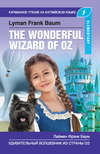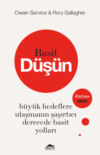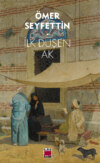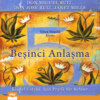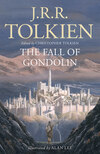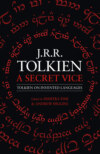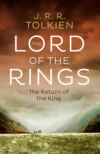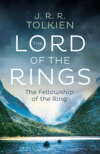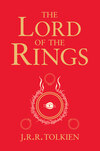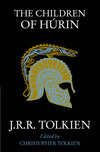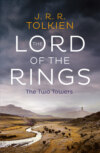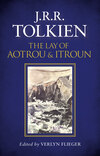Kitabı oku: «The Silmarillion», sayfa 8
CHAPTER 8
OF THE DARKENING OF VALINOR
When Manwë heard of the ways that Melkor had taken, it seemed plain to him that he purposed to escape to his old strongholds in the north of Middle-earth; and Oromë and Tulkas went with all speed northward, seeking to overtake him if they might, but they found no trace or rumour of him beyond the shores of the Teleri, in the unpeopled wastes that drew near to the Ice. Thereafter the watch was redoubled along the northern fences of Aman; but to no purpose, for ere ever the pursuit set out Melkor had turned back, and in secrecy passed away far to the south. For he was yet as one of the Valar, and could change his form, or walk unclad, as could his brethren; though that power he was soon to lose for ever.
Thus unseen he came at last to the dark region of Avathar. That narrow land lay south of the Bay of Eldamar, beneath the eastern feet of the Pelóri, and its long and mournful shores stretched away into the south, lightless and unexplored. There, beneath the sheer walls of the mountains and the cold dark sea, the shadows were deepest and thickest in the world; and there in Avathar, secret and unknown, Ungoliant had made her abode. The Eldar knew not whence she came; but some have said that in ages long before she descended from the darkness that lies about Arda, when Melkor first looked down in envy upon the Kingdom of Manwë, and that in the beginning she was one of those that he corrupted to his service. But she had disowned her Master, desiring to be mistress of her own lust, taking all things to herself to feed her emptiness; and she fled to the south, escaping the assaults of the Valar and the hunters of Oromë, for their vigilance had ever been to the north, and the south was long unheeded. Thence she had crept towards the light of the Blessed Realm; for she hungered for light and hated it.
In a ravine she lived, and took shape as a spider of monstrous form, weaving her black webs in a cleft of the mountains. There she sucked up all light that she could find, and spun it forth again in dark nets of strangling gloom, until no light more could come to her abode; and she was famished.
Now Melkor came to Avathar and sought her out; and he put on again the form that he had worn as the tyrant of Utumno: a dark Lord, tall and terrible. In that form he remained ever after. There in the black shadows, beyond the sight even of Manwë in his highest halls, Melkor with Ungoliant plotted his revenge. But when Ungoliant understood the purpose of Melkor, she was torn between lust and great fear; for she was loath to dare the perils of Aman and the power of the dreadful Lords, and she would not stir from her hiding. Therefore Melkor said to her: ‘Do as I bid; and if thou hunger still when all is done, then I will give thee whatsoever thy lust may demand. Yea, with both hands.’ Lightly he made this vow, as he ever did; and he laughed in his heart. Thus did the great thief set his lure for the lesser.
A cloak of darkness she wove about them when Melkor and Ungoliant set forth: an Unlight, in which things seemed to be no more, and which eyes could not pierce, for it was void. Then slowly she wrought her webs: rope by rope from cleft to cleft, from jutting rock to pinnacle of stone, ever climbing upwards, crawling and clinging, until at last she reached the very summit of Hyarmentir, the highest mountain in that region of the world, far south of great Taniquetil. There the Valar were not vigilant; for west of the Pelóri was an empty land in twilight, and eastward the mountains looked out, save for forgotten Avathar, only upon the dim waters of the pathless sea.
But now upon the mountain-top dark Ungoliant lay; and she made a ladder of woven ropes and cast it down, and Melkor climbed upon it and came to that high place, and stood beside her, looking down upon the Guarded Realm. Below them lay the woods of Oromë, and westward shimmered the fields and pastures of Yavanna, gold beneath the tall wheat of the gods. But Melkor looked north, and saw afar the shining plain, and the silver domes of Valmar gleaming in the mingling of the lights of Telperion and Laurelin. Then Melkor laughed aloud, and leapt swiftly down the long western slopes; and Ungoliant was at his side, and her darkness covered them.
Now it was a time of festival, as Melkor knew well. Though all tides and seasons were at the will of the Valar, and in Valinor there was no winter of death, nonetheless they dwelt then in the Kingdom of Arda, and that was but a small realm in the halls of Eä, whose life is Time, which flows ever from the first note to the last chord of Eru. And even as it was then the delight of the Valar (as is told in the Ainulindalë) to clothe themselves as in a vesture in the forms of the Children of Ilúvatar, so also did they eat and drink, and gather the fruits of Yavanna from the Earth, which under Eru they had made.
Therefore Yavanna set times for the flowering and the ripening of all things that grew in Valinor; and at each first gathering of fruits Manwë made a high feast for the praising of Eru, when all the peoples of Valinor poured forth their joy in music and song upon Taniquetil. This now was the hour, and Manwë decreed a feast more glorious than any that had been held since the coming of the Eldar to Aman. For though the escape of Melkor portended toils and sorrows to come, and indeed none could tell what further hurts would be done to Arda ere he could be subdued again, at this time Manwë designed to heal the evil that had arisen among the Noldor; and all were bidden to come to his halls upon Taniquetil, there to put aside the griefs that lay between their princes, and forget utterly the lies of their Enemy.
There came the Vanyar, and there came the Noldor of Tirion, and the Maiar were gathered together, and the Valar were arrayed in their beauty and majesty; and they sang before Manwë and Varda in their lofty halls, or danced upon the green slopes of the Mountain that looked west towards the Trees. In that day the streets of Valmar were empty, and the stairs of Tirion were silent; and all the land lay sleeping in peace. Only the Teleri beyond the mountains still sang upon the shores of the sea; for they recked little of seasons or times, and gave no thought to the cares of the Rulers of Arda, or the shadow that had fallen on Valinor, for it had not touched them, as yet.
One thing only marred the design of Manwë. Fëanor came indeed, for him alone Manwë had commanded to come; but Finwë came not, nor any others of the Noldor of Formenos. For said Finwë: ‘While the ban lasts upon Fëanor my son, that he may not go to Tirion, I hold myself unkinged, and I will not meet my people.’ And Fëanor came not in raiment of festival, and he wore no ornament, neither silver nor gold nor any gem; and he denied the sight of the Silmarils to the Valar and the Eldar, and left them locked in Formenos in their chamber of iron. Nevertheless he met Fingolfin before the throne of Manwë, and was reconciled, in word; and Fingolfin set at naught the unsheathing of the sword. For Fingolfin held forth his hand, saying: ‘As I promised, I do now. I release thee, and remember no grievance.’
Then Fëanor took his hand in silence; but Fingolfin said: ‘Half-brother in blood, full brother in heart will I be. Thou shalt lead and I will follow. May no new grief divide us.’
‘I hear thee,’ said Fëanor. ‘So be it.’ But they did not know the meaning that their words would bear.
It is told that even as Fëanor and Fingolfin stood before Manwë there came the mingling of the lights, when both Trees were shining, and the silent city of Valmar was filled with a radiance of silver and gold. And in that very hour Melkor and Ungoliant came hastening over the fields of Valinor, as the shadow of a black cloud upon the wind fleets over the sunlit earth; and they came before the green mound Ezellohar. Then the Unlight of Ungoliant rose up even to the roots of the Trees, and Melkor sprang upon the mound; and with his black spear he smote each Tree to its core, wounded them deep, and their sap poured forth as it were their blood, and was spilled upon the ground. But Ungoliant sucked it up, and going then from Tree to Tree she set her black beak to their wounds, till they were drained; and the poison of Death that was in her went into their tissues and withered them, root, branch, and leaf; and they died. And still she thirsted, and going to the Wells of Varda she drank them dry; but Ungoliant belched forth black vapours as she drank, and swelled to a shape so vast and hideous that Melkor was afraid.
So the great darkness fell upon Valinor. Of the deeds of that day much is told in the Aldudénië, that Elemmírë of the Vanyar made and is known to all the Eldar. Yet no song or tale could contain all the grief and terror that then befell. The Light failed; but the Darkness that followed was more than loss of light. In that hour was made a Darkness that seemed not lack but a thing with being of its own: for it was indeed made by malice out of Light, and it had power to pierce the eye, and to enter heart and mind, and strangle the very will.
Varda looked down from Taniquetil, and beheld the Shadow soaring up in sudden towers of gloom; Valmar had foundered in a deep sea of night. Soon the Holy Mountain stood alone, a last island in a world that was drowned. All song ceased. There was silence in Valinor, and no sound could be heard, save only from afar there came on the wind through the pass of the mountains the wailing of the Teleri like the cold cry of gulls. For it blew chill from the East in that hour, and the vast shadows of the sea were rolled against the walls of the shore.
But Manwë from his high seat looked out, and his eyes alone pierced through the night, until they saw a Darkness beyond dark which they could not penetrate, huge but far away, moving now northward with great speed; and he knew that Melkor had come and gone.
Then the pursuit was begun; and the earth shook beneath the horses of the host of Oromë, and the fire that was stricken from the hooves of Nahar was the first light that returned to Valinor. But so soon as any came up with the Cloud of Ungoliant the riders of the Valar were blinded and dismayed, and they were scattered, and went they knew not whither; and the sound of the Valaróma faltered and failed. And Tulkas was as one caught in a black net at night, and he stood powerless and beat the air in vain. But when the Darkness had passed, it was too late: Melkor had gone whither he would, and his vengeance was achieved.
CHAPTER 9
OF THE FLIGHT OF THE NOLDOR
After a time a great concourse gathered about the Ring of Doom; and the Valar sat in shadow, for it was night. But the stars of Varda now glimmered overhead, and the air was clear; for the winds of Manwë had driven away the vapours of death and rolled back the shadows of the sea. Then Yavanna arose and stood upon Ezellohar, the Green Mound, but it was bare now and black; and she laid her hands upon the Trees, but they were dead and dark, and each branch that she touched broke and fell lifeless at her feet. Then many voices were lifted in lamentation; and it seemed to those that mourned that they had drained to the dregs the cup of woe that Melkor had filled for them. But it was not so.
Yavanna spoke before the Valar, saying: ‘The Light of the Trees has passed away, and lives now only in the Silmarils of Fëanor. Foresighted was he! Even for those who are mightiest under Ilúvatar there is some work that they may accomplish once, and once only. The Light of the Trees I brought into being, and within Eä I can do so never again. Yet had I but a little of that light I could recall life to the Trees, ere their roots decay; and then our hurt should be healed, and the malice of Melkor be confounded.’
Then Manwë spoke and said: ‘Hearest thou, Fëanor son of Finwë, the words of Yavanna? Wilt thou grant what she would ask?’
There was long silence, but Fëanor answered no word. Then Tulkas cried: ‘Speak, O Noldo, yea or nay! But who shall deny Yavanna? And did not the light of the Silmarils come from her work in the beginning?’
But Aulë the Maker said: ‘Be not hasty! We ask a greater thing than thou knowest. Let him have peace yet awhile.’
But Fëanor spoke then, and cried bitterly: ‘For the less even as for the greater there is some deed that he may accomplish but once only; and in that deed his heart shall rest. It may be that I can unlock my jewels, but never again shall I make their like; and if I must break them, I shall break my heart, and I shall be slain; first of all the Eldar in Aman.’
‘Not the first,’ said Mandos, but they did not understand his word; and again there was silence, while Fëanor brooded in the dark. It seemed to him that he was beset in a ring of enemies, and the words of Melkor returned to him, saying that the Silmarils were not safe, if the Valar would possess them. ‘And is he not Vala as are they,’ said his thought, ‘and does he not understand their hearts? Yea, a thief shall reveal thieves!’ Then he cried aloud: ‘This thing I will not do of free will. But if the Valar will constrain me, then shall I know indeed that Melkor is of their kindred.’
Then Mandos said: ‘Thou hast spoken.’ And Nienna arose and went up onto Ezellohar, and cast back her grey hood, and with her tears washed away the defilements of Ungoliant; and she sang in mourning for the bitterness of the world and the Marring of Arda.
But even as Nienna mourned, there came messengers from Formenos, and they were Noldor and bore new tidings of evil. For they told how a blind Darkness came northward, and in the midst walked some power for which there was no name, and the Darkness issued from it. But Melkor also was there, and he came to the house of Fëanor, and there he slew Finwë King of the Noldor before his doors, and spilled the first blood in the Blessed Realm; for Finwë alone had not fled from the horror of the Dark. And they told that Melkor had broken the stronghold of Formenos, and taken all the jewels of the Noldor that were hoarded in that place; and the Silmarils were gone.
Then Fëanor rose, and lifting up his hand before Manwë he cursed Melkor, naming him Morgoth, the Black Foe of the World; and by that name only was he known to the Eldar ever after. And he cursed also the summons of Manwë and the hour in which he came to Taniquetil, thinking in the madness of his rage and grief that had he been at Formenos his strength would have availed more than to be slain also, as Melkor had purposed. Then Fëanor ran from the Ring of Doom, and fled into the night; for his father was dearer to him than the Light of Valinor or the peerless works of his hands; and who among sons, of Elves or of Men, have held their fathers of greater worth?
Many there grieved for the anguish of Fëanor, but his loss was not his alone; and Yavanna wept by the mound, in fear that the Darkness should swallow the last rays of the Light of Valinor for ever. For though the Valar did not yet understand fully what had befallen, they perceived that Melkor had called upon some aid that came from beyond Arda. The Silmarils had passed away, and all one it may seem whether Fëanor had said yea or nay to Yavanna; yet had he said yea at the first, before the tidings came from Formenos, it may be that his after deeds would have been other than they were. But now the doom of the Noldor drew near.
Meanwhile Morgoth escaping from the pursuit of the Valar came to the wastes of Araman. This land lay northward between the Mountains of the Pelóri and the Great Sea, as Avathar lay to the south; but Araman was a wider land, and between the shores and the mountains were barren plains, ever colder as the Ice drew nearer. Through this region Morgoth and Ungoliant passed in haste, and so came through the great mists of Oiomúrë to the Helcaraxë, where the strait between Araman and Middle-earth was filled with grinding ice; and he crossed over, and came back at last to the north of the Outer Lands. Together they went on, for Morgoth could not elude Ungoliant, and her cloud was still about him, and all her eyes were upon him; and they came to those lands that lay north of the Firth of Drengist. Now Morgoth was drawing near to the ruins of Angband, where his great western stronghold had been; and Ungoliant perceived his hope, and knew that here he would seek to escape from her, and she stayed him, demanding that he fulfil his promise.
‘Blackheart!’ she said. ‘I have done thy bidding. But I hunger still.’
‘What wouldst thou have more?’ said Morgoth. ‘Dost thou desire all the world for thy belly? I did not vow to give thee that. I am its Lord.’
‘Not so much,’ said Ungoliant. ‘But thou hast a great treasure from Formenos; I will have all that. Yea, with both hands thou shalt give it.’
Then perforce Morgoth surrendered to her the gems that he bore with him, one by one and grudgingly; and she devoured them, and their beauty perished from the world. Huger and darker yet grew Ungoliant, but her lust was unsated. ‘With one hand thou givest,’ she said; ‘with the left only. Open thy right hand.’
In his right hand Morgoth held close the Silmarils, and though they were locked in a crystal casket, they had begun to burn him, and his hand was clenched in pain; but he would not open it. ‘Nay!’ he said. ‘Thou hast had thy due. For with my power that I put into thee thy work was accomplished. I need thee no more. These things thou shalt not have, nor see. I name them unto myself for ever.’
But Ungoliant had grown great, and he less by the power that had gone out of him; and she rose against him, and her cloud closed about him, and she enmeshed him in a web of clinging thongs to strangle him. Then Morgoth sent forth a terrible cry, that echoed in the mountains. Therefore that region was called Lammoth; for the echoes of his voice dwelt there ever after, so that any who cried aloud in that land awoke them, and all the waste between the hills and the sea was filled with a clamour as of voices in anguish. The cry of Morgoth in that hour was the greatest and most dreadful that was ever heard in the northern world; the mountains shook, and the earth trembled, and rocks were riven asunder. Deep in forgotten places that cry was heard. Far beneath the ruined halls of Angband, in vaults to which the Valar in the haste of their assault had not descended, Balrogs lurked still, awaiting ever the return of their Lord; and now swiftly they arose, and passing over Hithlum they came to Lammoth as a tempest of fire. With their whips of flame they smote asunder the webs of Ungoliant, and she quailed, and turned to flight, belching black vapours to cover her; and fleeing from the north she went down into Beleriand, and dwelt beneath Ered Gorgoroth, in that dark valley that was after called Nan Dungortheb, the Valley of Dreadful Death, because of the horror that she bred there. For other foul creatures of spider form had dwelt there since the days of the delving of Angband, and she mated with them, and devoured them; and even after Ungoliant herself departed, and went whither she would into the forgotten south of the world, her offspring abode there and wove their hideous webs. Of the fate of Ungoliant no tale tells. Yet some have said that she ended long ago, when in her uttermost famine she devoured herself at last.
And thus the fear of Yavanna that the Silmarils would be swallowed up and fall into nothingness did not come to pass; but they remained in the power of Morgoth. And he being freed gathered again all his servants that he could find, and came to the ruins of Angband. There he delved anew his vast vaults and dungeons, and above their gates he reared the threefold peaks of Thangorodrim, and a great reek of dark smoke was ever wreathed about them. There countless became the hosts of his beasts and his demons, and the race of the Orcs, bred long before, grew and multiplied in the bowels of the earth. Dark now fell the shadow on Beleriand, as is told hereafter; but in Angband Morgoth forged for himself a great crown of iron, and he called himself King of the World. In token of this he set the Silmarils in his crown. His hands were burned black by the touch of those hallowed jewels, and black they remained ever after; nor was he ever free from the pain of the burning, and the anger of the pain. That crown he never took from his head, though its weight became a deadly weariness. Never but once only did he depart for a while secretly from his domain in the North; seldom indeed did he leave the deep places of his fortress, but governed his armies from his northern throne. And once only also did he himself wield weapon, while his realm lasted.
For now, more than in the days of Utumno ere his pride was humbled, his hatred devoured him, and in the domination of his servants and the inspiring of them with lust of evil he spent his spirit. Nonetheless his majesty as one of the Valar long remained, though turned to terror, and before his face all save the mightiest sank into a dark pit of fear.
Now when it was known that Morgoth had escaped from Valinor and pursuit was unavailing, the Valar remained long seated in darkness in the Ring of Doom, and the Maiar and the Vanyar stood beside them and wept; but the Noldor for the most part returned to Tirion and mourned for the darkening of their fair city. Through the dim ravine of the Calacirya fogs drifted in from the shadowy seas and mantled its towers, and the lamp of the Mindon burned pale in the gloom.
Then suddenly Fëanor appeared in the city and called on all to come to the high court of the King upon the summit of Túna; but the doom of banishment that had been laid upon him was not yet lifted, and he rebelled against the Valar. A great multitude gathered swiftly, therefore, to hear what he would say; and the hill and all the stairs and streets that climbed upon it were lit with the light of many torches that each one bore in hand. Fëanor was a master of words, and his tongue had great power over hearts when he would use it; and that night he made a speech before the Noldor which they ever remembered. Fierce and fell were his words, and filled with anger and pride; and hearing them the Noldor were stirred to madness. His wrath and his hate were given most to Morgoth, and yet well nigh all that he said came from the very lies of Morgoth himself; but he was distraught with grief for the slaying of his father, and with anguish for the rape of the Silmarils. He claimed now the kingship of all the Noldor, since Finwë was dead, and he scorned the decrees of the Valar.
‘Why, O people of the Noldor,’ he cried, ‘why should we longer serve the jealous Valar, who cannot keep us nor even their own realm secure from their Enemy? And though he be now their foe, are not they and he of one kin? Vengeance calls me hence, but even were it otherwise I would not dwell longer in the same land with the kin of my father’s slayer and of the thief of my treasure. Yet I am not the only valiant in this valiant people. And have ye not all lost your King? And what else have ye not lost, cooped here in a narrow land between the mountains and the sea?
‘Here once was light, that the Valar begrudged to Middle-earth, but now dark levels all. Shall we mourn here deedless for ever, a shadow-folk, mist-haunting, dropping vain tears in the thankless sea? Or shall we return to our home? In Cuiviénen sweet ran the waters under unclouded stars, and wide lands lay about, where a free people might walk. There they lie still and await us who in our folly forsook them. Come away! Let the cowards keep this city!’
Long he spoke, and ever he urged the Noldor to follow him and by their own prowess to win freedom and great realms in the lands of the East, before it was too late; for he echoed the lies of Melkor, that the Valar had cozened them and would hold them captive so that Men might rule in Middle-earth. Many of the Eldar heard then for the first time of the Aftercomers. ‘Fair shall the end be,’ he cried, ‘though long and hard shall be the road! Say farewell to bondage! But say farewell also to ease! Say farewell to the weak! Say farewell to your treasures! More still shall we make. Journey light: but bring with you your swords! For we will go further than Oromë, endure longer than Tulkas: we will never turn back from pursuit. After Morgoth to the ends of the Earth! War shall he have and hatred undying. But when we have conquered and have regained the Silmarils, then we and we alone shall be lords of the unsullied Light, and masters of the bliss and beauty of Arda. No other race shall oust us!’
Then Fëanor swore a terrible oath. His seven sons leapt straightway to his side and took the selfsame vow together, and red as blood shone their drawn swords in the glare of the torches. They swore an oath which none shall break, and none should take, by the name even of Ilúvatar, calling the Everlasting Dark upon them if they kept it not; and Manwë they named in witness, and Varda, and the hallowed mountain of Taniquetil, vowing to pursue with vengeance and hatred to the ends of the World Vala, Demon, Elf or Man as yet unborn, or any creature, great or small, good or evil, that time should bring forth unto the end of days, whoso should hold or take or keep a Silmaril from their possession.
Thus spoke Maedhros and Maglor and Celegorm, Curufin and Caranthir, Amrod and Amras, princes of the Noldor; and many quailed to hear the dread words. For so sworn, good or evil, an oath may not be broken, and it shall pursue oathkeeper and oathbreaker to the world’s end. Fingolfin and Turgon his son therefore spoke against Fëanor, and fierce words awoke, so that once again wrath came near to the edge of swords. But Finarfin spoke softly, as was his wont, and sought to calm the Noldor, persuading them to pause and ponder ere deeds were done that could not be undone: and Orodreth, alone of his sons, spoke in like manner. Finrod was with Turgon, his friend; but Galadriel, the only woman of the Noldor to stand that day tall and valiant among the contending princes, was eager to be gone. No oaths she swore, but the words of Fëanor concerning Middle-earth had kindled in her heart, for she yearned to see the wide unguarded lands and to rule there a realm at her own will. Of like mind with Galadriel was Fingon Fingolfin’s son, being moved also by Fëanor’s words, though he loved him little; and with Fingon stood as they ever did Angrod and Aegnor, sons of Finarfin. But these held their peace and spoke not against their fathers.
At length after long debate Fëanor prevailed, and the greater part of the Noldor there assembled he set aflame with the desire of new things and strange countries. Therefore when Finarfin spoke yet again for heed and delay, a great shout went up: ‘Nay, let us be gone!’ And straightway Fëanor and his sons began to prepare for the marching forth.
Little foresight could there be for those who dared to take so dark a road. Yet all was done in over-haste; for Fëanor drove them on, fearing lest in the cooling of their hearts his words should wane and other counsels yet prevail; and for all his proud words he did not forget the power of the Valar. But from Valmar no message came, and Manwë was silent. He would not yet either forbid or hinder Fëanor’s purpose; for the Valar were aggrieved that they were charged with evil intent to the Eldar, or that any were held captive by them against their will. Now they watched and waited, for they did not yet believe that Fëanor could hold the host of the Noldor to his will.
And indeed when Fëanor began the marshalling of the Noldor for their setting-out, then at once dissension arose. For though he had brought the assembly in a mind to depart, by no means all were of a mind to take Fëanor as King. Greater love was given to Fingolfin and his sons, and his household and the most part of the dwellers in Tirion refused to renounce him, if he would go with them; and thus at the last as two divided hosts the Noldor set forth upon their bitter road. Fëanor and his following were in the van, but the greater host came behind under Fingolfin; and he marched against his wisdom, because Fingon his son so urged him, and because he would not be sundered from his people that were eager to go, nor leave them to the rash counsels of Fëanor. Nor did he forget his words before the throne of Manwë. With Fingolfin went Finarfin also and for like reasons; but most loath was he to depart. And of all the Noldor in Valinor, who were grown now to a great people, but one tithe refused to take the road: some for the love that they bore to the Valar (and to Aulë not least), some for the love of Tirion and the many things that they had made; none for fear of peril by the way.
But even as the trumpet sang and Fëanor issued from the gates of Tirion a messenger came at last from Manwë, saying: ‘Against the folly of Fëanor shall be set my counsel only. Go not forth! For the hour is evil, and your road leads to sorrow that ye do not foresee. No aid will the Valar lend you in this quest; but neither will they hinder you; for this ye shall know: as ye came hither freely, freely shall ye depart. But thou Fëanor Finwë’s son, by thine oath art exiled. The lies of Melkor thou shalt unlearn in bitterness. Vala he is, thou saist. Then thou hast sworn in vain, for none of the Valar canst thou overcome now or ever within the halls of Eä, not though Eru whom thou namest had made thee thrice greater than thou art.’
But Fëanor laughed, and spoke not to the herald, but to the Noldor, saying: ‘So! Then will this valiant people send forth the heir of their King alone into banishment with his sons only, and return to their bondage? But if any will come with me, I say to them: Is sorrow foreboded to you? But in Aman we have seen it. In Aman we have come through bliss to woe. The other now we will try: through sorrow to find joy; or freedom, at the least.’
Ücretsiz ön izlemeyi tamamladınız.

